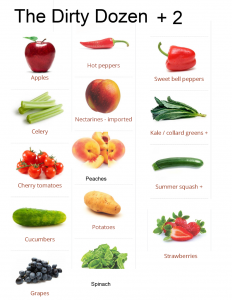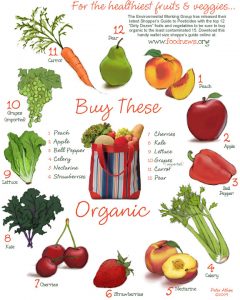In follow up to this week’s JAMA article linking pesticides to ALS, Evolve Medical highlights the 2016 “Dirty Dozen” list of foods with the most pesticides.
Every year, the Environmental Working Group (EWG) produces a “Shopper’s Guide to Pesticides in Produce,” based on the US Department of Agriculture’s (USDA) sampling. The 2016 report is based on USDA inspection of 6,953 pieces of produce and found 146 different pesticides on fruit and vegetable samples, nearly three-fourths of all samples. The pesticides persisted on fruits and vegetables tested by USDA – even when they were washed and, in some cases, peeled.
Key findings
- More than 98 percent of strawberry samples, peaches, nectarines, and apples tested positive for at least one pesticide residue.
- The average potato had more pesticides by weight than any other produce.
- A single grape sample and a sweet bell pepper sample contained 15 pesticides.
- Single samples of strawberries showed 17 different pesticides.
The Dirty Dozen
 Strawberries
Strawberries
- Apples
- Nectarines
- Peaches
- Celery
- Grapes
- Cherries
- Spinach
- Tomatoes
- Sweet bell pepper
- Cherry tomatoes
- Cucumbers
- Hot peppers
- Kale/Collard greens
The Dirty Dozen list was expanded to include numbers 13 and 14 because these two American food crops – leafy greens and hot peppers – are of special concern. Residue tests by the USDA have found these foods laced with particularly toxic pesticides which are no longer detected widely on other produce, either because of binding legal restrictions or voluntary phase-outs. These pesticides are believed to be toxic to the human nervous system. EWG recommends that people who eat a lot of these foods buy organic instead.
Are Pesticides Really a Health Concern?
In December 2012, the 60,000-member physician organization, The American Academy of Pediatrics (AAP), took the unprecedented step of issuing a policy statement that called on the government, schools, parents and medical professionals to take concerted action to protect children from pesticides. The AAP rarely involves itself in politics and governmental affairs.
The report said that children have “unique susceptibilities to [pesticide residues’] potential toxicity.” The pediatricians’ organization cited research that linked pesticide exposures in early life and “pediatric cancers, decreased cognitiv e function, and behavioral problems.” It advised its members to urge parents to consult “reliable resources that provide information on the relative pesticide content of various fruits and vegetables.” The EWG is considered a “reliable resource.”
e function, and behavioral problems.” It advised its members to urge parents to consult “reliable resources that provide information on the relative pesticide content of various fruits and vegetables.” The EWG is considered a “reliable resource.”
The study titled “Pesticide Exposure in Children,” published in the Journal of Pediatrics that year concluded:
“Efforts should be made to limit children’s exposure as much as possible and to ensure that products released to the marketplace have been appropriately tested for safety to protect fetuses, infants, and children from adverse effects.”
What Can You Do?
According to Dr. Landrigan, the Director of Children’s Environmental Health Center at Mt. Sinai School of Medicine, “Parents looking for help in lowering their children’s exposure to pesticides while still eating plenty of healthy fruits and vegetables can turn to the Environmental Working Group’s guide as an easy-to-use resource when shopping at the store.”
The link to the EWG food scores are here. The “Clean Fifteen” list is below. 
- Avocados
- Sweet corn
- Pineapples
- Cabbage
- Sweet peas frozen
- Onions
- Asparagus
- Mangos
- Papayas
- Kiwi
- Eggplant
- Honeydew melon
- Grapefruit
- Cantaloupe
- Cauliflower
If you have any questions about pesticides or related illness, see your primary care physician or Pediatrician. Evolve Medical is also happy to see you. Same day scheduling on-line here or call 844-322-4222. Or email them at [email protected].
If you find these health and wellness updates helpful, follow Evolve Medical on Facebook, Twitter, Instagram or Google+.









































